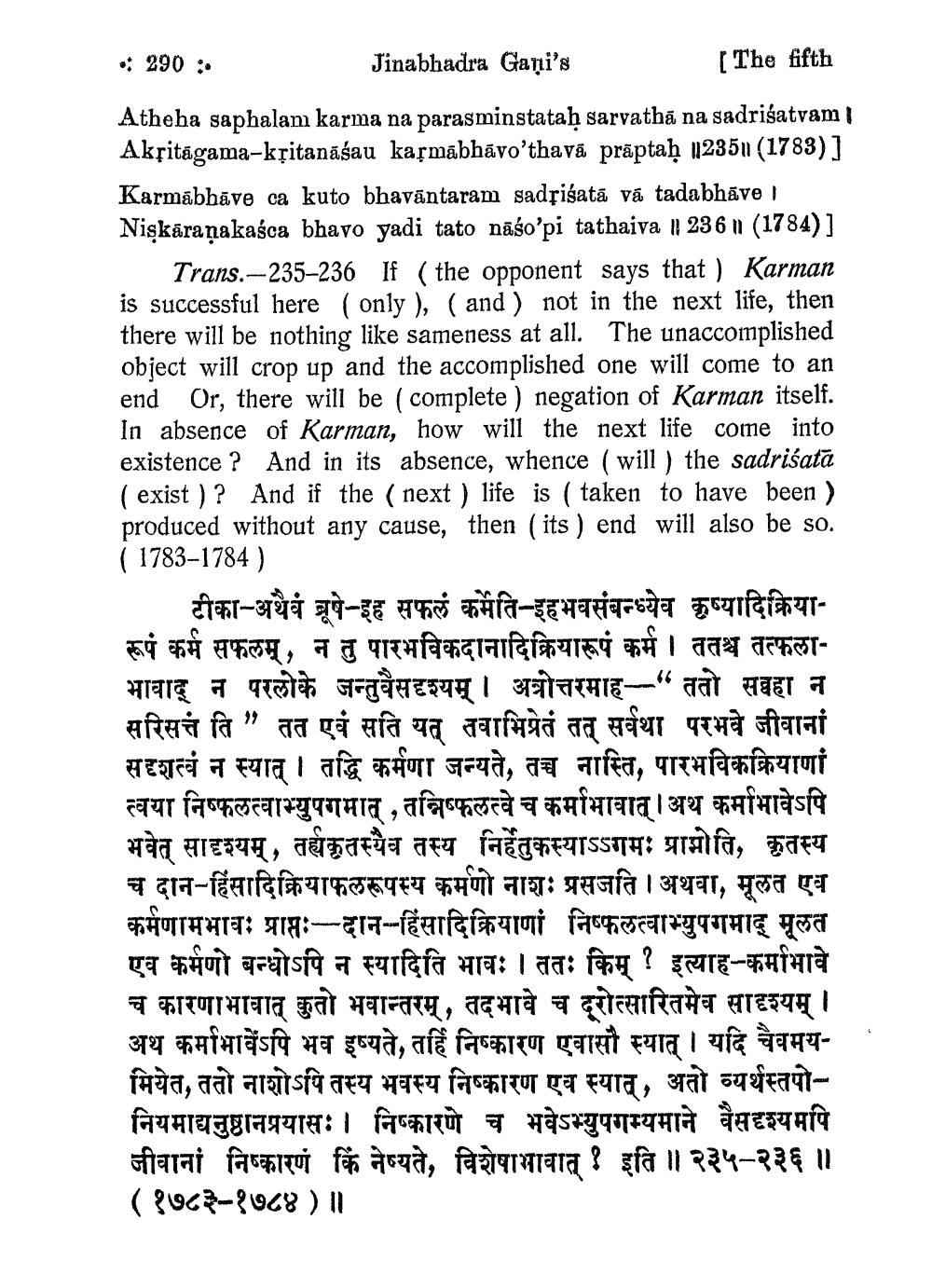________________
• 290 :
Jinabhadra Gani's
[The fifth
Atheha saphalam karma na parasminstataḥ sarvathā na sadrisatvam Akritagama-kritanasau karmabhāvo'thava prāptah 0235॥ (1783)] Karmabhāve ca kuto bhavāntaram sadfißatā vá tadabhāve i Niskāranakasca bhavo yadi tato naso'pi tathaiva ॥ 236॥ (1784)]
Trans.--235-236 If (the opponent says that ) Karman is successful here ( only ), ( and ) not in the next life, then there will be nothing like sameness at all. The unaccomplished object will crop up and the accomplished one will come to an end Or, there will be ( complete ) negation of Karman itself. In absence of Karman, how will the next life come into existence ? And in its absence, whence ( will ) the sadrisata ( exist ) ? And if the ( next ) life is ( taken to have been) produced without any cause, then (its ) end will also be so. ( 1783-1784)
टीका-अथैवं ब्रूषे-इह सफलं कर्मेति-इहभवसंबन्ध्येव कृष्यादिक्रियारूपं कर्म सफलम् , न तु पारभविकदानादिक्रियारूपं कर्म । ततश्च तत्फलाभावाद् न परलोके जन्तुवैसदृश्यम् । अत्रोत्तरमाह-" ततो सबहा न सरिसत्तं ति" तत एवं सति यत् तवाभिप्रेतं तत् सर्वथा परभवे जीवानां सदृशत्वं न स्यात् । तद्धि कर्मणा जन्यते, तच नास्ति, पारभविकक्रियाणां त्वया निष्फलत्वाभ्युपगमात् , तन्निष्फलत्वे च कर्माभावात् । अथ कर्माभावेऽपि भवेत् सादृश्यम् , तबकृतस्यैव तस्य निर्हेतुकस्याऽऽगमः प्राप्नोति, कृतस्य च दान-हिंसादिक्रियाफलरूपस्य कर्मणो नाशः प्रसजति । अथवा, मूलत एव कर्मणामभावः प्राप्तः-दान-हिंसादिक्रियाणां निष्फलत्वाभ्युपगमाद् मूलत एव कर्मणो बन्धोऽपि न स्यादिति भावः । ततः किम् ? इत्याह-कर्माभावे च कारणाभावात् कुतो भवान्तरम् , तदभावे च दूरोत्सारितमेव सादृश्यम् । अथ कर्माभावेऽपि भव इष्यते, तर्हि निष्कारण एवासौ स्यात् । यदि चैवमयमियेत, ततो नाशोऽपि तस्य भवस्य निष्कारण एव स्यात् , अतो व्यर्थस्तपोनियमाद्यनुष्ठानप्रयासः। निष्कारणे च भवेऽभ्युपगम्यमाने वैसदृश्यमपि जीवानां निष्कारणं किं नेष्यते, विशेषाभावात् ? इति ॥ २३५-२३६ ॥ (१७८३-१७८४)॥




